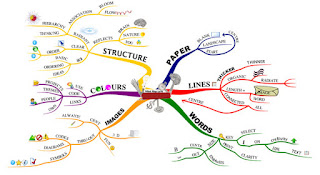Tony Buzan,
the creator of Mind Mapping, says “A Mind Map is a powerful graphic
technique which provides a universal key to unlock the potential of the
brain. It harnesses the full range of cortical skills – word, image,
number, logic, rhythm, colour and spatial awareness – in a single,
uniquely powerful manner.
 In so doing, it gives you the freedom to roam
the infinite expanses of your brain. The Mind Map can be applied to
every aspect of life where improved learning and clearer thinking will
enhance human performance.”
In so doing, it gives you the freedom to roam
the infinite expanses of your brain. The Mind Map can be applied to
every aspect of life where improved learning and clearer thinking will
enhance human performance.”
This image is also from his website.
Here, at The Edith Ellen Foundation, we are not medically qualified so we would recommend working alongside a professional when developing your own Mind Map.
When preparing a Mind Map, always work with the families and Service Users - this is their map not yours. The golden rule of using mind maps in healthcare settings is to provide
information to a patient, the patient’s family, or another service
provider. It’s all about customising any “standardised” templates used
to fit the patient’s needs, beliefs, behaviours, priorities, and
background.
- Just as those with cognitive decline may be able to remember, plan, express themselves, and document their lives in maps, caregivers may be able to use these techniques themselves to provide better care and client management. Mind maps may potentially help the caregiver recall the preferences of the client, as well as the client’s life history, important events, significant people, and life style
- Caregivers may find that visual information recorded in mind maps provides a good way for the caregiver and the client to start discussions.
- Caregivers may find that clients can express themselves better with pictures, drawings, doodles than in words.
- Caregivers may find that their own notes from each day are more useful if captured in the format of mind maps.
- Caregivers may find that mind maps may be used for brainstorming by themselves, with healthcare providers, with family members, and with the client ways to organize daily events, select food and clothing, remember medications, and organize social events.
- Caregivers may find it useful to record their own feelings in mind maps as a way of dealing with the emotional and physical stress of caregiving.
- The daily calendar — including doctor visits and other appointments and visitors — may be easier to prepare as a mind map and much more useful to the client.
Mind Maps need to bright, colourful and fun - here are a few examples of Mindmaps





No comments:
Post a Comment